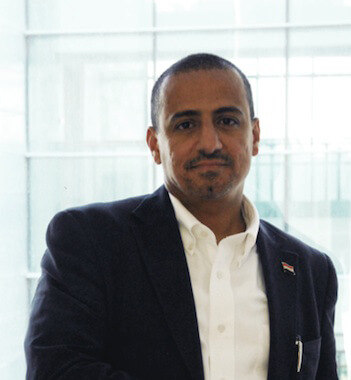Interview with Ahmed Bazara, Vice Chairman of AMTC
Yemen’s Bazara family has been in business for over 150 years. Originally celebrated for its specialisation in the food industry, over the years the family has sharpened its business acumen further via a wave of diversification. In 1951, Abobakr Omer Bazara spearheaded the founding of the Automotive & Machinery Trading Centre (AMTC). Starting with a number of automobile dealerships in South Yemen, the business later expanded north.
The Bazara family continually grew AMTC until diversification was implemented in 2000: The Bazaras diversified their activities into banking, insurance, steel manufacturing, education and health fields. The automotive business is still at the core of the Bazara family business and is in its second generation of familial ownership, with a third generation soon to join.
Ahmed Bazara, son of AMTC’s founder, grew up with his father’s business and joined its ranks immediately following university. Today, he is the Vice Chairman of AMTC and a member of the progressive Yemeni Business Club, an organisation engaging in a national dialogue to improve the business environment of Yemen. In an interview with Ahmed Bazara, Tharawat magazine discovers the nature of Yemeni family businesses and exactly what their dedication means for the future of their country.
How are Yemeni family businesses different from their peers in other countries?
A family business is family business no matter where it is from. During a few family business courses that I have taken, this is a fact that struck me most: No matter where the other participants were from, they essentially were concerned with the same things. In the end it is all about people and their interactions.
How do Yemeni family businesses anticipate the next generation’s involvement?
Our family business is currently going through a restructuring and the assiduous task of setting up governance structures. In the case of the next generation we have setup a policy that requires members to acquire two years of external experience before joining the business. This in spite of us being in critical need of their help at this stage. It was there before, but was very simple. But now we’re addressing so many issues.
The approach to this issue is different from family to family. Most families I meet encounter problems with managing the next generation. In some cases the family founder is proactive and takes early measures starting the dialogue between generations. Others are having serious trouble letting go of the control and sharing it with the next generations. This can lead to the failure of the family business. We see both extremes in the family business community.
Are Yemeni families actively supporting entrepreneurship?
Absolutely. There are a couple of nice examples of big family businesses that are developing the entrepreneurial skills of their young generation members. Of course these are large businesses that are global and have the resources to do this. Another approach families take is to support their next generation’s ventures outside the family business in order to provide them relevant experience. But still, many family businesses will encourage the next generation to walk in the footsteps of the previous generations.
Do Yemeni family businesses prioritise the use of governance structures?
We know they do since many of them come to the Yemeni Business Club for advice. We either lend help where we can or we know for sure they are already in the process. We set up this governance task force in Yemen about seven years back. We get many people involved in this; public and private sector, society, accountants, bankers association and the central bank. It took us four years till we produced the first corporate governance guideline for Yemeni businesses. We have a lot of directors training with it. It’s not just the large companies that take this avenue: I have seen companies with as low as fifty employees starting this process.
Whenever we’re talking about governance, we’re talking about so many things.
The family and the relationship between the family members as well the business comes into play. Our aim is to create awareness and to provide tools as well.

Is the Yemeni business community actively creating employment?
I think that’s more or less a given. The government is not the first employer anymore. It used to be but now the private sector is the number one employer. Family businesses and the private sector in general are becoming more socially responsible. The big companies are becoming active in public issues. After the revolution the Yemen is going into national dialogue. It’s part of the power transfer. It is a hectic and long process. In this process other issues such as women’s rights, youth, civil society, political parties, tribes, and education are addressed. This reflects the social involvement of the private sector and family business as well. The private sector is heavily involved in this process. They can see the added value, and the business opportunities as well.
What are the main objectives of Yemeni family businesses?
The most important challenge they have is the economy. Our population is around 25 million people; 50 per cent of the population is below the age of fifteen. And 75 per cent of the population is between fifteen and thirty, so you can imagine how much infrastructure and education as well as job opportunities are required. It’s a very big challenge. If we do not address these issues immediately they can represent a big threat in the future. The economy requires stability. First, I mean security and political stability. Politics might never be stable, but they should be conducive to economic development. If the economy grows in the right direction, we can have more businesses, we can have more opportunities for our youth, we can spend more on education and better standards. But, at this particular moment, it is very difficult.
We are all very active in bringing the right change about. We call it The Economic Reform Agenda. We formed a task force of experts from academia, private sector, civil society, media and other areas and set up a plan, which is aligned with that of the government. It is more practically oriented and the donor countries as well as diplomatic missions in Yemen are working with us on this. These kinds of private sector objectives are proactive and much different than before.
Family businesses are highly qualified to undertake such missions because they are used to tackling multi-level issues. It’s a lot of work, but that reflects the kind of responsibility and pro-activeness that the Yemeni private sector considers its priority.
Tharawat Magazine, Issue 17, 2013
















